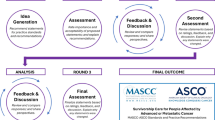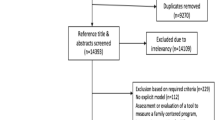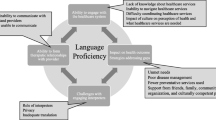Abstract
Although the use of palliative care has increased in recent years, chronically ill Americans within a racial/ethnic minority (non-White) population underutilize this supportive and comfort-giving healthcare service. Consequently, chronically ill minority Americans experience increased pain, symptom burden, and inappropriate use of healthcare resources compared to their white counterparts. A literature review was conducted to compile and synthesize the current state of research pertinent to improving the use of palliative care among chronically ill minority Americans. Selection criteria produced 18 relevant publications, which aided in developing a conceptual model that assimilated early, episodic, and late palliative care phases along the chronic illness continuum. The goal of the conceptual model was to provide a roadmap for healthcare professionals to use when designing, implementing, managing, and/or evaluating palliative care services for chronically ill minority Americans. The literature review demonstrated that minority patients benefitted the most from culturally tailored, systematic interventions (such as advanced care planning education) in all phases of palliative care, which led to increases in advance directive completion, better symptom control, and hospice utilization. The article concludes with a discussion and fictional case study portraying the importance of culturally tailored early palliative care as a catalyst for engaging minority patients in palliative care services.


Similar content being viewed by others
References
World Health Organization. WHO definition of palliative care. https://www.who.int/cancer/palliative/definition/en/ Accessed May 29, 2019.
Kelley AS, Morrison RS. Palliative care for the seriously ill. N Engl J Med. 2015;373:747–55.
Zaide GB, Pekmezaris R, Nouryan CN, Mir TP, Sison CP, Liberman T, et al. Ethnicity, race, and advance directives in an inpatient palliative care consultation service. Palliat Support Care. 2013;11(1):5–11.
Kavalieratos D, Mitchell E, Carey T. Not the ‘grim reaper service: an assessment of provider knowledge, attitudes, and perceptions regarding palliative care referral barriers in heart failure. J Am Heart Assoc. 2014;3(1):e000544.
Cunningham T, Croft J, Liu Y, et al. Vital signs: racial disparities in age-specific mortality among Blacks or African Americans – United States, 1999-2015. MMWR Morb Mortal Wkly Rep. 2017;66:444–56.
NHPCO Facts and Figures: Hospice Care in America. Alexandria, VA: National Hospice and Palliative Care Organization. Rev. ed. April 2018. https://www.nhpco.org/sites/default/files/public/Statistics_Research/2017_Facts_Figures.pdf Accessed May 29, 2019.
Wachterman MW, Lipsitz SR, Lorenz KA, Marcantonio ER, Li Z, Keating NL. End-of-life experience of older adults dying of end-stage renal disease: a comparison with cancer. J Pain Symptom Manag. 2017;54:789–97.
Cain CL, Surbone A, Elk R, Kagawa-Singer M. Culture and palliative care: preferences, communication, meaning, and mutual decision making. J Pain Symptom Manag. 2018;55:1408–19.
Fang ML, Sixsmith J, Sinclair S, Horst G. A knowledge synthesis of culturally – and spiritually – sensitive end-of-life care: findings from a scoping review. BMC Geriatr. 2016;16(107):1–14.
Karasouli E, Munday D, Bailey C, Staniszewska S, Hewison A, Griffiths F. Qualitative critical incident study of patients’ experiences leading to emergency hospital admission with advanced respiratory illness. BMJ Open. 2016;6(2):eoo9030.
Volands A, Ariza M, Abbo E, Paasche-Orlow M. Overcoming educational barriers for advance care planning in Latinos with video images. J Palliat Med. 2008;11:700–6.
Song M-K, Ward S, Lin F-C, et al. Racial differences in outcomes of an advance care planning intervention for dialysis patients and their surrogates. J Palliat Med. 2016;19:134–42.
Lyon M, Squires L, D’Angelo L, et al. FAmily-CEntered (FACE) advanced care planning among African-American and non-African-American adults living with HIV in Washington, DC: a randomized controlled trail to increase documentation and health equity. J Pain Symptom Manag. 2019;57:607–16.
Huang C-HS, Crowther M, Allen RS, DeCoster J, Kim G, Azuero C, et al. A pilot feasibility intervention to increase advance care planning among African Americans in the Deep South. J Palliat Med. 2016;19:164–73.
Lee M, Hinder K, Friedmann E. Engaging Chinese American adults in advance care planning. J Geront Nurs. 2015;41(8):17–21.
Sun A, Bui Q, Tsoh J, et al. Efficacy of a church-based, culturally tailored program to promote completion of advance directives among Asian Americans. J Immigr Minor Health. 2017;19:381–91.
Chen J, Varges-Bustamante A, Mortenen K, et al. Racial and ethnic disparities in health care access and utilization under the affordable care act. Med Care. 2016;54(2):140–6.
Bell C, Kuriya M, Fischberg D. Hospice referrals and code status: outcomes of inpatient palliative care consultations among Asian Americans and Pacific Islanders with cancer. J Pain Symptom Manag. 2011;42:557–64.
Marr L, Neale D, Wolfe V, Kitzes J. Confronting myths: the Native American experience in an academic impatient palliative care consultation program. J Palliat Med. 2012;15:71–6.
Zalenski RJ, Jones SS, Courage C, Waselewsky DR, Kostaroff AS, Kaufman D, et al. Impact of palliative care screening and consultation in the ICU: a multihospital quality improvement project. J Pain Symptom Manag. 2017;53:5–12 e13.
Pecanac M, Repenshek M, Tennenbaum D, Hammes B. Respecting Choices® and advance directives in a diverse community. J Palliat Med. 2014;17:282–7.
Rocque G, Dionne-Odom N, Huang C-H, et al. Implementation and impact of patient lay-navigator-led advance care planning conversations. J Pain Symptom Manag. 2017;53:682–92.
Evangelista L, Motie M, Lombardo D, Ballard-Hernandez J, Malik S, Liao S. Does preparedness planning improve attitudes and completion of advance directives in patients with symptomatic heart failure? J Palliat Med. 2012;15:1316–20.
Zalenski R, Courage C, Edelen A, et al. Evaluation of screening criteria for palliative care consultation in the MICH: a multihospital analysis. BMJ. 2014;0:1–9.
Fisher SM, Kline DM, Min S-J, Okuyama-Sasaki S, Fink RM. Effect of Apoyo con Cariño (Support With Caring) trial of a patient navigator intervention to improve palliative care outcomes for Latino adults with advanced cancer: a randomized clinical trial. JAMA Oncol. 2018;4(12):1736–47.
Sacco J, Deravin Car D, Viola D. The effects of the palliative medicine consolation on the DNR status of African Americans in a safety-net hospital. Am J Hosp Palliat Care. 2013;30(4):363–9.
Sharma R, Cameron K, Chmiel J, et al. Racial/ethnic differences in inpatient palliative care consultation for patients with advanced cancer. J Clin Oncol. 2015;33:3802–8.
Shen M, Prigerson H, Paulk E, et al. Impact of end-of-life discussion on the reduction of Latino/non-Latino disparities in do-not-resuscitate order completion. Cancer. 2016;122:1749–56.
Periyakoil VS, Neri E, Kraemer H. Patient-reported barriers to high-quality, end-of-life care: a multiethnic, multilingual, mixed-methods study. J Palliat Med. 2016;19(4):373–9.
Hopp F, Zalenski R, Waselewsky D, et al. Results of a hospital-based palliative care intervention for patients with an acute exacerbation of chronic heart failure. J Card Fail. 2016;22:1033–6.
Acknowledgments
The authors thank Dr. Glenn Ostir and Dr. Lovoria Williams for their assistance with the manuscript.
Author information
Authors and Affiliations
Corresponding author
Ethics declarations
Conflict of Interest
The authors declare that they have no conflict of interest.
Additional information
Publisher’s Note
Springer Nature remains neutral with regard to jurisdictional claims in published maps and institutional affiliations.
Rights and permissions
About this article
Cite this article
Gazaway, S., Stewart, M. & Schumacher, A. Integrating Palliative Care into the Chronic Illness Continuum: a Conceptual Model for Minority Populations. J. Racial and Ethnic Health Disparities 6, 1078–1086 (2019). https://doi.org/10.1007/s40615-019-00610-y
Received:
Revised:
Accepted:
Published:
Issue Date:
DOI: https://doi.org/10.1007/s40615-019-00610-y




